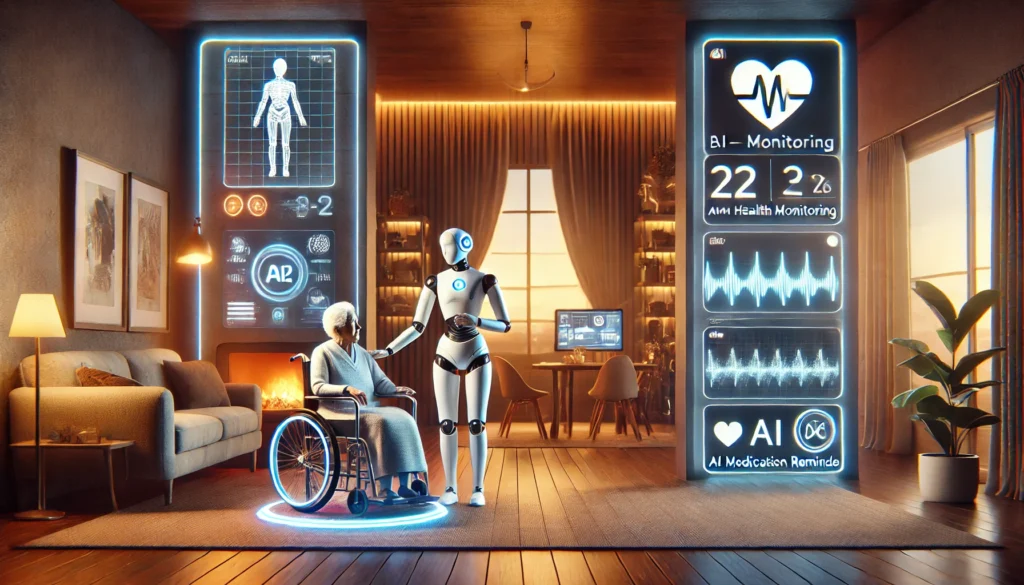
Want to listen instead?
🏡 Smart Homes, Smarter Care: How AI is Revolutionizing Home Health
Imagine a home that anticipates your needs, assists in daily tasks, and even monitors your health—this is the promise of smart home technology acting as a caretaker. With advancements in artificial intelligence (AI), the Internet of Things (IoT), and automation, homes are evolving from passive shelters to proactive caregivers. From monitoring chronic health conditions to enhancing daily convenience, smart homes can significantly improve quality of life, especially for the elderly, disabled individuals, and those managing chronic illnesses.
At Mindful Diabetes Inc., we explore innovative health technologies through our Pathways to Wellness series. Today, we delve into how smart home systems are becoming intelligent caregivers, assisting individuals in ways that were once science fiction. These technological advancements are not just about convenience—they are about safety, independence, and enhancing overall well-being.
In this article, we will explore how smart home technology is transforming caregiving, covering health monitoring, daily assistance, and emergency response systems. Let’s step into the future of home care.
❤️ Join Us in Preventing Type 3 Diabetes
Your gift supports scientifically backed prevention programs, cognitive-health education, and AI tools that help families reduce the risk of Alzheimer’s-like symptoms linked to diabetes.
Mindful Diabetes Inc. is a 501(c)(3) nonprofit — all donations are fully tax-deductible.
🏠 Smart Homes as Caregivers: How Technology Enhances Daily Living
📡 1. Remote Health Monitoring and Management
Smart home technology is redefining health care by offering continuous health monitoring. Sensors, wearables, and AI-powered assistants are now capable of tracking vital signs, detecting anomalies, and even alerting caregivers or emergency services when necessary.
- Smart Wearables & Health Trackers: Devices like Fitbit, Apple Watch, and biosensors continuously monitor heart rate, glucose levels, oxygen saturation, and more. These can sync with home systems to notify users and caregivers of abnormal readings.
- AI-Powered Medication Reminders: Automated pill dispensers and voice assistants remind individuals to take their medication on time, reducing the risk of missed doses and improving adherence to treatment plans.
- Smart Beds & Mattresses: These track sleep quality, detect irregular breathing, and can even adjust positions automatically to prevent bedsores in bedridden individuals.
- Connected Medical Devices: Blood pressure monitors, glucose meters, and ECG sensors can integrate with smart home hubs to send data directly to doctors or family members.
💡 Example: An elderly person living alone with diabetes can have their glucose levels monitored through a smart patch. If blood sugar drops dangerously low, the home system can notify a caregiver or emergency services.
🌟 Try Our Free Wellness Tools!
Set the high score in our Mindful Eating Game, explore JEIR, or dive deeper into the science behind our AI-driven prevention tools!
🤖 Try JEIR — Your AI Wellness Guide 🎮 Play the Mindful Eating Game 📘 Read About the Mindful Eating Game 🤖📘 Read About the AI Behind JEIR🔄 2. Automating Daily Assistance for Independence
For individuals with mobility challenges, cognitive impairments, or chronic conditions, smart homes provide essential daily assistance. AI-powered automation helps with routine tasks, making independent living safer and more manageable.
- Voice-Controlled Assistants: Devices like Amazon Alexa and Google Assistant help individuals control lighting, appliances, and reminders without needing to move.
- Smart Kitchens for Assisted Cooking: Induction cooktops with auto-shutoff features, voice-activated recipe assistants, and automated coffee makers make meal preparation easier and safer.
- Fall Detection & Mobility Assistance: Smart floors with pressure sensors detect falls and automatically alert emergency contacts. Robotic assistants can help individuals stand, walk, or reach objects.
- Customized Lighting & Climate Control: Smart lighting adjusts based on time of day, activity level, or even mood. Thermostats learn preferences to maintain optimal comfort levels.
💡 Example: A person with early-stage dementia can benefit from a smart home that gently reminds them to hydrate, turn off appliances, or even guide them through daily tasks using voice prompts.
🚨 3. Emergency Response & Safety Enhancements
One of the most critical functions of a smart home as a caretaker is its ability to provide real-time emergency response. AI-driven safety measures can prevent injuries, alert authorities, and create a secure living environment.
- Automated Emergency Alerts: In case of a medical emergency, smart devices can call emergency services automatically based on biometric readings or verbal distress signals.
- AI-Powered Security Systems: Smart cameras, door locks, and alarms help prevent intrusions and ensure that vulnerable individuals are safe.
- Gas, Fire & Water Leak Detection: Smart sensors detect gas leaks, smoke, and flooding, automatically shutting down utilities and notifying homeowners or emergency services.
- Geo-Fencing for Dementia Patients: For individuals with Alzheimer’s or dementia, smart homes can prevent wandering by sending alerts if a door is opened unexpectedly or by tracking location through wearables.
💡 Example: If an elderly person with mobility issues falls in the bathroom, a combination of fall detection sensors and AI-driven emergency response can automatically call for help while unlocking the front door for first responders.
🚀 Smart Door Solutions & Mindful Diabetes Inc.: Partnering for Smarter, More Accessible Living
At Mindful Diabetes Inc., we are committed to exploring innovative health solutions that improve daily living for individuals managing diabetes, mobility challenges, and chronic conditions. As part of this mission, we are proud to highlight our partnership with Smart Door Solutions (SDS)—a company dedicated to pioneering AI-driven accessibility technology through their groundbreaking system, JERI (Joe’s Entry Regulation Interface).
Together, we recognize that true wellness extends beyond healthcare—it includes creating smarter, safer, and more accessible home environments for individuals who need them most.
🌍 JERI: Redefining Home Accessibility & Caregiving
JERI isn’t just a smart home tool—it’s an AI-powered home entry system designed to enhance mobility, independence, and safety for individuals living with diabetes-related neuropathy, arthritis, mobility impairments, and other accessibility challenges.
🔍 Through an ongoing SDS-led survey, they are gathering insights on:
- The biggest accessibility challenges in home entry systems.
- How touchless, adaptive door automation can benefit people with diabetes, mobility impairments, or chronic illnesses.
- The role of AI in creating intuitive home environments that support health, security, and independence.
💡 Example: A person managing diabetes-related mobility issues may struggle with traditional door handles or locks. JERI provides a seamless, hands-free entry solution, reducing physical strain while increasing safety and convenience.
🔗 Help Shape the Future of Smart Accessibility
As part of Smart Door Solutions’ development of JERI, they are conducting an ongoing customer insights survey to better understand the real-world needs of individuals living with chronic conditions, aging-related mobility challenges, and home accessibility concerns.
📍 How You Can Get Involved:
✅ Take the SDS Survey – Your input will directly shape the next evolution of smart home accessibility technology.
✅ Join the JERI Beta Testing Program – Be among the first to experience a truly non-contact, door operating system.
✅ Follow Our Collaboration – Stay updated as Mindful Diabetes Inc. & Smart Door Solutions work together to bring accessible smart living to more people.
🚀 A smarter home means a healthier, safer future. Join us in shaping the next frontier of AI-powered accessibility.
📩 Take the Survey Today!
🏡 Conclusion: The Home of the Future is Here
Smart homes are no longer just about convenience—they are becoming intelligent caregivers, offering life-enhancing support to individuals managing chronic conditions, aging in place, or living with disabilities. As AI and IoT continue to advance, homes will become an integral part of personalized healthcare, ensuring safety, independence, and improved quality of life.
At Mindful Diabetes Inc., we are dedicated to exploring innovative ways to enhance wellness. Through our Pathways to Wellness series, we aim to provide valuable insights into how emerging technologies can empower individuals to take control of their health.
Whether it’s through health monitoring, daily assistance, or emergency response systems, the smart home of the future is not just a house—it’s a caretaker, a companion, and a guardian.
Are you ready to embrace the future of smart home caregiving? Let us know how technology is transforming your daily life!
📖 Continue Exploring 🌐
Don’t stop here! Dive deeper into the fascinating connection between mental wellness and physical health in our upcoming blogs. There’s always more to discover and explore.
💌 Stay Informed and Inspired 📬
Subscribe to our newsletter for the latest insights, tips, and updates on the mindful path to better health. Together, we’ll continue to unlock the secrets of a balanced and vibrant life.
Thank you for your continued support and readership. Here’s to a healthier, happier you! 🌈💚




